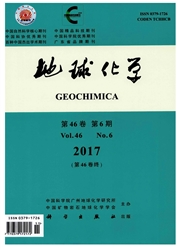

 中文摘要:
中文摘要:
高成熟度条件下,热作用和热化学硫酸盐还原反应(TSR)会强烈影响天然气的化学和同位素组成,这给气藏的气源对比带来很大的困难。考虑到TSR发生的温度与凝析油大量形成的阶段吻合,本研究选择正庚烷和甲苯两种C7化合物在程序升温条件下开展模拟实验,重点关注轻烃中不同结构烃类的TSR行为差异,以及热作用和TSR对天然气组成的不同影响。实验结果表明:首先,甲苯在高温下可发生强烈TSR反应,地质条件下芳香烃的TSR过程可能不容忽视;其次,TSR反应导致气态烃碳同位素显著变重(480℃以下);最后,从对照组与实验组的甲烷产率与碳同位素差异来看,本研究中甲烷并未直接参与TSR反应,甲烷的化学变化更多的是TSR反应通过影响更高碳数烃类(甲烷前体物)来实现的。这些认识可以为地质条件下评估轻烃的TSR行为提供参考,有助于进一步提高热作用和TSR作用对天然气不同影响的理解。
 英文摘要:
英文摘要:
At high maturities, strong alterations in the chemical and isotopic compositions of natural gases can be caused by both thermal cracking and TSR (thermochemical sulfate reduction) processes, which will bring about difficulties in identifying the gas source. By considering that the temperature range of TSR reaction is identical to that of peak generation of condensates, n-heptane and toluene were selected as model compounds to conduct simulation experiments in a temperature programmed furnace, to reveal the characteristics of TSR behavior for saturated and aromatic hydrocarbons and to discriminate the effects of thermal cracking from TSR processes on natural gas. The results illustrate that: 1. toluene is intensively involved in TSR reaction at high temperatures, implying that TSR of aromatic hydrocarbons under geological conditions should not be ignored; 2. TSR processes can lead to the 13C enrichment of hydrocarbon gases significantly; and 3. according to the differences in yields and carbon isotopes of methane between the blank group and the TSR group, it can be deduced that methane does not directly take part in TSR reaction in these experiments, methane evolution is possibly due to the effect of TSR on its precursors. These findings can provide a reference to evaluate the TSR behaviors of light hydrocarbons under geological conditions and improve our understandings toward the different effects of thermal cracking and TSR processes on natural gas.
 同期刊论文项目
同期刊论文项目
 同项目期刊论文
同项目期刊论文
 Identification and formation of sulfur-containing steroids in heavy oils with high sulfur content in
Identification and formation of sulfur-containing steroids in heavy oils with high sulfur content in Geochemical Explication of Sulfur Organics Characterized by Fourier Transform Ion Cyclotron Resonanc
Geochemical Explication of Sulfur Organics Characterized by Fourier Transform Ion Cyclotron Resonanc Molecular characterization of sulfur compounds in some specieal sulfur-rich Chinese crude oils by FT
Molecular characterization of sulfur compounds in some specieal sulfur-rich Chinese crude oils by FT The impact of inorganically bound sulfur on late shale gas generation studied by non-isothermal clos
The impact of inorganically bound sulfur on late shale gas generation studied by non-isothermal clos Gas evolution during kerogen pyrolysis of Estonian Kukersite shale in confined gold tube system (vol
Gas evolution during kerogen pyrolysis of Estonian Kukersite shale in confined gold tube system (vol Molecular characterization of sulfur compounds in some special sulfur-rich Chinese crude oils by FT-
Molecular characterization of sulfur compounds in some special sulfur-rich Chinese crude oils by FT- Monoaromatic,Diaromatic, Triaromatic, and Tetraaromatic Hopanes in Kukersite Shale and TheirStable C
Monoaromatic,Diaromatic, Triaromatic, and Tetraaromatic Hopanes in Kukersite Shale and TheirStable C 2,3,6-/2,3,4-ArylIsoprenoids in Paleocene Crude Oils from Chinese Jianghan Basin: Constrained byWate
2,3,6-/2,3,4-ArylIsoprenoids in Paleocene Crude Oils from Chinese Jianghan Basin: Constrained byWate 期刊信息
期刊信息
